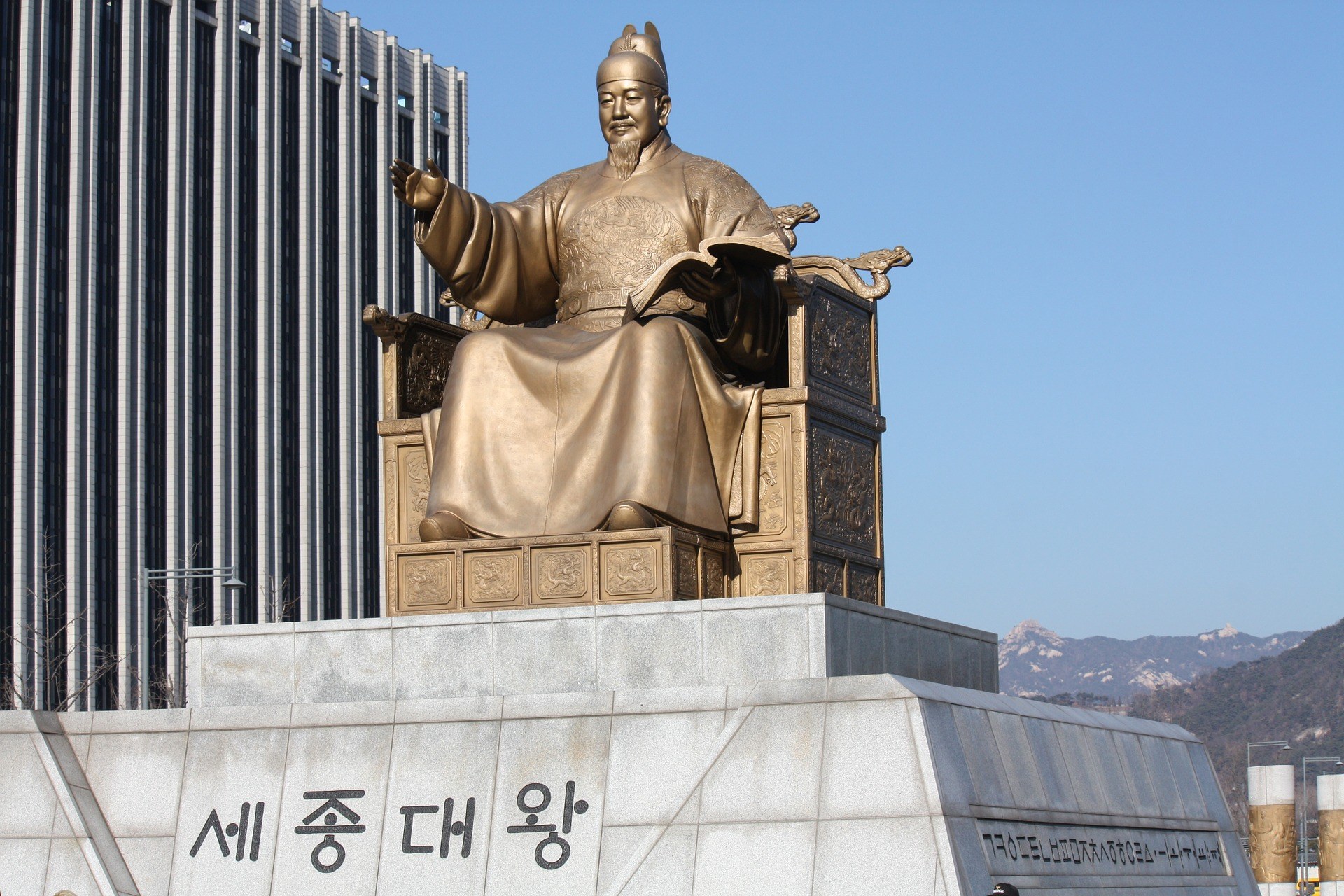The Great King Sejong
Born as the third prince, Chung Nyeong, was far from ascending the throne. His early years were turbulent as Korea faced political tensions from both within and abroad and facing abduction as a boy to make matters worse. Eventually, the young prince finds himself living in a private residence outside of the palace and experiences the everyday life of commoners until he is a young man. Later on his ascension to the throne, Chung Nyeong (now called King Se Jong) stabilizes the newly born country and gives rise to the blooming culture of Joseon. In the process, he invents Hangul, the Korean writing system. Rewatch Value 4.0 If the wild historical liberties of fusion sageuk are grating on you, The Great King Sejong is a refreshing alternative. Hewing relatively closely to fact, it generates its dramatic power through complex characterizations and thoughtful explorations of moral quandaries.
Biography of King Sejong the Great of Korea. This famous king of Korea invented the Korean script, hangul. How can the answer be improved? Sejong facts: Sejong (1397-1450) was a Korean king and inventor of the Korean alphabet. His long reign, 1418-1450, is generally acknowledged to have been the most.
Sejong’s reign may have been lauded precisely for its lack of drama, but the writers find plenty of conflict to build engaging story lines around, as they explore the challenges of ruling with benevolence rather than terror. They do an excellent job exploring how political systems stymie or support progress, as they build a compelling argument for governing to the better angels of our nature. That being said, this is not a fast show to watch. There are no love triangles, gorgeous warriors with great hair, gravity defying ninja moves, or epic cliffhangers. Many of the best acted and most intriguing characters are the various grey-haired ministers in their matching robes and odd hats, who for once are given compelling personalities instead of serving as indistinguishable agents of repression.
The first half of the show is particularly strong, in part due to outstanding performances by Kim Young Chul as Taejong and Choi Myung Gil as his embittered queen. Taejong may be monstrous, but he’s also powerfully human, and the show loses some of its spark when he exits the scene. The second half is weaker, perhaps because the series was cut down from 100 episodes to 86.
This causes pacing issues, as some events are rushed through while drawn-out moments of pathos feel unearned due to a lack of dramatic set-up. Subplots get dropped and major characters disappear without acknowledgment or comment. It also means that Sejong comes off as far more serious than perhaps he was, as the show leaves out such “frivolous” elements of his life as his love of music and his passionate relationships with his concubines. In general, the show is more comfortable in the elegiac than the celebratory mode, but its tendency to emphasize loss sometimes deflects attention from just how extraordinary Sejong’s achievements were.
It may be difficult to do great things, but there is great joy in such success as well.

Sejong Daewang 세종대왕 - 世宗大王 Ring 1418 – 1450 September 18, 1418 ( 1418-09-18) (aged 21) Predecessor Successor Regent (1418–1422) Born Mey 15, 1397 ( 1397-05-15), Dee'd Aprile 8, 1450 ( 1450-04-08) (aged 52), Issue 10 legitimate issues out of 22: — Ps. 1415), — (b.1417), — Pe. GuangPyung (b. 1434) Faither Mither Releegion Confucianism Korean name Sejong Daewang Sejong Taewang I Do Yi To Childhood name Won Jeong Wŏn Chŏng. Statue o Sejong, locatit in Seoul Sejong the Great (15 Mey 1397 – 8 Apryle 1450, r. 1418–1450) wis the fowert keeng o. Born wi the faimily name ( 이; 李), gien name Do ( 도; 祹), faimily oreegin Jeonju ( 전주; 全州), sobriquet Wonjung ( 원정; 元正).
The Great King Sejong Drama
Posthumous name is Sejong ( 세종; 世宗). Posthumous title, abbreviatit, is JangHun Great Keeng ( 장헌대왕; 莊憲大王), an offeecial title is Sejong Jangheon Yeongmun Yemu Inseong Myeonghyo Daewang ( 세종 장헌 영문 예무 인성 명효 대왕; 世宗 莊憲 英文 睿武 仁聖 明孝 大王). He wis the third son atween an Queen-Consort Min. He wis designatit as heir-apparent, Grand Prince, efter his aulder brither Jae wis strippit o his title. He ascendit tae the throne in 1418. Durin the first fower years o his reign, govrened as regent, an this wis when his faither-in-law, an his close associates wur executit.

Sejong reinforcit policies an executit major legal amendments ( 공법; 貢法). He owersaw the creation o an aw, encouragit advancements o scientific technology, an institutit mony ither efforts tae stabilize an impruive prosperity. He dispatched militar campaigns tae the north an instawed Samin Policy ( 사민정책; 徙民政策) tae attract new settlers tae the region. Tae the sooth, he subjugatit Japanese raiders an captured. Durin his reign frae 1418 tae 1450, he govrened frae 1418 tae 1442 an govrened as regent wi his son Grand Prince till his daith in 1450.
Sejong is ane o anerly twa Korean rulers posthumously honored wi the appellation ', the ither bein.